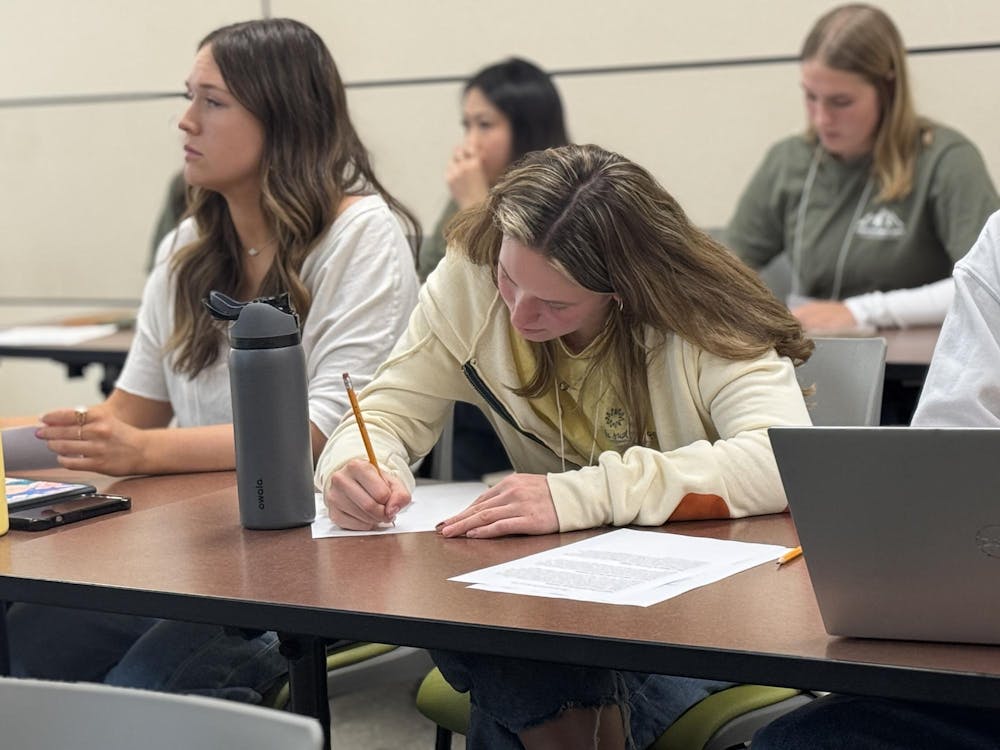The Office of Sustainability hosted its first Student Sustainability Summit at the Learning Center for Sustainable Futures on Feb. 21.
The summit was coordinated by the Office of Sustainability and student volunteers within Sustainable Carolina, and funded by a grant from the Central Midlands Council of Government. The summit was a collection of student-led workshops and presentations and drew a crowd of around 80 students, Associate Director for the Office of Sustainability Jessie McNevin said.
“Knowing that that engagement is there and people are sharing their passions, that's only going to have a larger ripple effect. I can't wait to see what comes out of this conference,” McNevin said.
McNevin said the summit was advertised through Eco Ambassadors, a new part of Sustainable Carolina’s outreach program. Eco Ambassadors has over 1,200 students involved, McNevin said.
“The concept behind Eco Ambassadors was an opportunity to allow students at all levels and at all time availability to get more involved in sustainability on campus through our office,” fourth-year finance and marketing student Katie Poer, who helped found Eco Ambassadors, said. “It's kind of, as we viewed it, a nice bridge program to dip your toes in the water of sustainability on campus through making it more open and inviting, without it feeling like a burden.”
For a student to become an Eco Ambassador, they must complete a certain five requirements, Poer said. This includes attending either a sustainability 101 or environmental justice 101 lecture, a hands-on workshop, a discussion workshop, volunteering in the garden and completing community service within the sustainability office.
"I think it's a really good opportunity to help develop some skills and learn through collaborating with others," Poer said. "I think sustainability is very applicable to everyone in all things."
At the Summit, students from a variety of majors gave presentations and led workshops, discussing topics including fast fashion, environmentalism in Latin America and heat mapping in Columbia. Hands-on workshops covered topics including planting trees, cleaning up trash around Green Quad and upcycling, or using recyclable or discarded material to create new items.
“I really enjoyed the trash pickup,” second-year environmental studies and dance student Claire Hirsch said. “I always love doing hands-on activities that help make me feel like I'm having a tangible impact on helping our environment. And I think it's really important to keep our nature spaces clean as students here, because we're so lucky to have some green spaces around campus.”
Some workshops were run by outside organizations, including “Seed Packing: Milkweed for Monarchs,” led by graduate environmental science student Connor Chilton. Chilton interns with the South Carolina Wildlife Federation, who run the Monarchs and Milkweed Program.
“Monarch butterflies specifically need milkweed for their larva… milkweed and monarch populations have been declining really, really badly,” Chilton said. “So this gives the opportunity for native milkweed seeds to go to anybody who signs up (for) their program in the state of South Carolina. We're filling 5,000 orders of it.”
Not all student presenters were members of Sustainable Carolina but still wanted to speak about environmental topics that were important to them. Second-year environmental studies student Anna Petruzzi, a member of the summit planning committee, and fourth-year public health student Maggie O’Leary, a non-member, presented on fast fashion and how to shop for sustainable clothing. Their presentation was adapted from an environmental studies project they did last semester, Petruzzi said.
“(Awareness of fast fashion) is definitely super important . . . especially for USC students, because a lot of people don't realize exactly what the impact is of buying clothes from fast fashion companies,” O’Leary said. “A lot of people are thinking, ‘Oh, Shein's cheap, so that'll be fine.’ Our age group is the biggest (demographic) for fast fashion, especially with our use of social media.”
Third-year international business student Hanna El Khantour said she felt that initiatives like the Student Sustainability Summit were important to have on campus so that students could realize their potential to create change.
“I think sustainability is the basis of everything that we're going to try and build in the future,” El Khantour said. “Because if we don't worry about it now, it will be too late. I think it's important to have initiatives on campus that make people more aware of everything that they can do, so that we can live on this planet for as long as we want.”
Third-year environmental studies and political science student Jackson Hensley, a member of Sustainable Carolina, said that the goal of the summit was to bring people and organizations from across campus together to collaborate and share ideas about sustainability.
“I hope that they've learned something, and there are action items that they can take from it to help make our community better,” Hensley said.
Sustainable Carolina allows students who are passionate about sustainability, service, and future success to develop as leaders and dedicate their time to improving campus sustainability.

